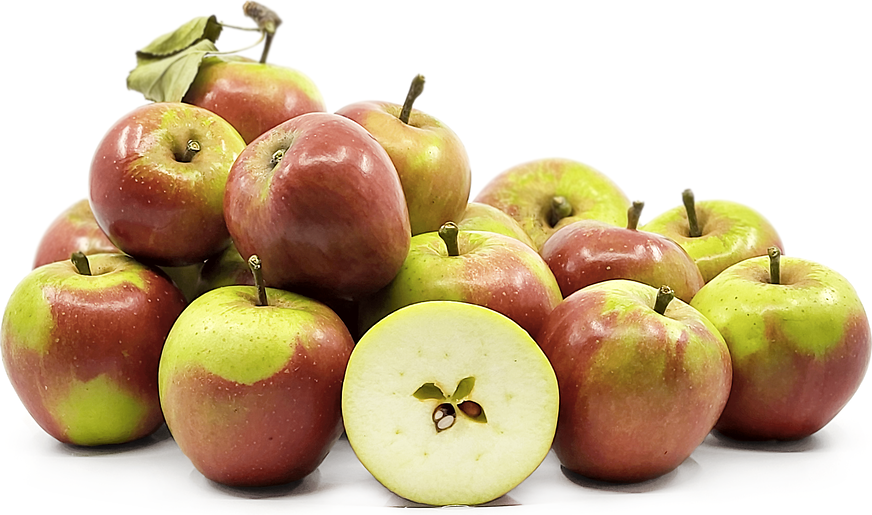


Winston Apples
Estimated Inventory, 1 Lb : 0
Description/Taste
Winston apples are a small to medium-sized varietal, averaging 6 to 7 centimeters in diameter, and have a round to conical shape with a short and fibrous green-brown stem. The apples showcase a yellow-green base coloring and are almost entirely covered in patches of dark red to burgundy blush and striations. The skin is also smooth with a semi-gloss finish, and there is the occasional tan russet present in the narrow stem cavity. Underneath the surface, the flesh is ivory, slightly tinged with green, and has a fine-grained consistency creating a firm, aqueous, and crunchy texture. The flesh also encases a small central cavity filled with tiny dark brown seeds. Winston apples have high acidity when harvested, bearing a sharp, sour, and subtly sweet flavor. As the apples are left in storage, the acidity mellows and becomes balanced with the sugar content, developing an aromatic, sweet, and tangy taste.
Seasons/Availability
Winston apples are available in the mid-fall through winter.
Current Facts
Winston apples, botanically classified as Malus domestica, are a 20th century English variety belonging to the Rosaceae family. The crunchy, sweet-tart apples are a late-season cultivar created from a cross between cox’s orange pippin and Worcester pearmain apples. Winston apples are also known as Winter King, Winter Cheer, and Red Winston apples, and the variety was selected for its aromatic flavoring and extended storage capabilities, keeping 5 to 6 months when properly stored. The cultivar is primarily a home garden variety in the United Kingdom and is one of the few apple trees that are self-fertile, meaning they do not require another tree for pollination. Winston apples are also resistant to disease, compact, and hardy, adaptable to all regions of the United Kingdom. Despite their numerous qualities as a home garden cultivar, Winston apples are not commercially cultivated due to their small size and laborious fruit thinning requirements. The trees must be hand-thinned each season as the tree overproduces fruitlets, leading the variety to become an expensive apple to grow for profit. When in season, Winston apples are primarily consumed as fresh eating apples and are eaten as a snack, dessert, juice, or cider.
Nutritional Value
Winston apples are an excellent source of vitamin C to strengthen the immune system and reduce inflammation, fiber to regulate the digestive tract, and potassium to balance fluid levels within the body. The apples also contain vitamin E to protect the cells against free radical damage, vitamin A to maintain healthy organ functioning, and other amounts of vitamin K, calcium, phosphorus, magnesium, copper, iron, and boron.
Applications
Winston apples have a sweet and tangy flavor well suited for fresh preparations. The apples are typically consumed after they have been left in storage for some time as the acidity in the flesh will mellow, creating a balanced, sweet-tart flavor. The apples can be consumed straight, out of hand, eaten with or without the skin, depending on preference. Winston apples can also be chopped into slaws, tossed into salads, thinly sliced and layered on top of toast or in sandwiches, or quartered and served with fresh cheeses on charcuterie boards. The apple’s fine-grained flesh can be used as a topping over chia seed pudding, cereals, pancakes, waffles, and porridge, dipped into nut butter or chocolate as a savory-sweet snack, or it can be blended into smoothies, pressed into juice, or used as a base flavoring for cider. In addition to fresh uses, Winston apples can be sliced into rings and dried for extended use. Winston apples pair well with cinnamon, vanilla, maple syrup, chocolate, nuts such as pistachios, almonds, pecans, and walnuts, and dried fruits including cherries, raisins, and cranberries. Whole, unwashed Winston apples will keep for 5 to 6 months when stored in cold storage.
Ethnic/Cultural Info
Winston apples were originally known as Winter King apples when they were bred in Berkshire in the 1920s and 1930s. The variety received its name in honor of its late-season harvest and long shelf life, with many of the apples lasting well into the early spring when kept in proper cold storage. Winter King apples were later introduced to the Royal Horticultural Society, or RHS, one of the most prominent garden charities to promote fruit varieties suitable for cultivation throughout the United Kingdom. When the apples were presented to the RHS in 1944, they were renamed Winston apples after Winston Churchill, the famous British World War II military leader and prime minister of Great Britain. World War II was still happening during 1944, eventually ending in 1945, and Winston Churchill was well-known throughout England for uniting the country with allies such as the United States and Russia to fight against invading Germany. Winter King apples were renamed Winston apples as a symbol of patriotism and to commemorate the English military leader. It is unknown whether Winston Churchill was able to sample the variety named after him, but the apples are still widely grown as a home garden cultivar across the United Kingdom in the modern-day.
Geography/History
Winston apples are native to England and were bred in the 1920s at Welford Park, an estate in the county of Berkshire. The variety was created by nurseryman William Pope and was a cross of two famous English apple varieties, cox’s orange pippin and Worcester pearmain apples. The variety was later released to commercial growers in 1935 and became a popular home garden cultivar. Winston apples were given the Award of Garden Merit by the Royal Horticultural Society, RHS, in 1993, and the RHS later reconfirmed the variety as a quality garden cultivar in 2013. Today Winston apples are primarily found in private orchards, home gardens, and select specialty orchards throughout the United Kingdom. The apples are also grown in limited quantities in The Netherlands.




